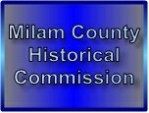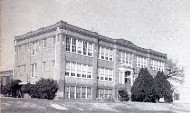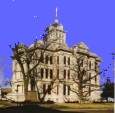Milam County Historical Commission
Milam County, Texas
All credit for these articles go to
Susie Sansom-Piper and
the Rockdale Reporter
Milam County, Texas
All credit for these articles go to
Susie Sansom-Piper and
the Rockdale Reporter






index to Black History month articles
Written by Susie Sansom-Piper and
published in the Rockdale Reporter
Written by Susie Sansom-Piper and
published in the Rockdale Reporter
ON THE OTHER SIDE OF THE TRACKS, SERIES 9, PART 3
Editor’s note: This is the third article in the ninth series of “On the Other Side of the
Tracks,” a Black History Month series by former Rockdale resident, and longtime teacher,
Susie Sansom-Piper.
Forties and Fifties, War and Changes
By SUSIE SANSOM-PIPER
Reporter contributor
World War II began with the bombing of Pearl Harbor on Dec. 7, 1941.
This brought about many drastic changes. Certain foods and clothing apparel was rationed.
Many young men were drafted into the armed services, which, at this time was segregated
Aycock High school had six teachers. The school’s first coach, Gentry Lee Powell was
drafted. Marion T. Benson, former student, was on the USS Arizona when it was bombed.
So many new adjustments had to be made, yet, a wholesome community life persevered.
Prof. O. E. Wilhite was principal of the six teacher school.
FORTIES — During these years, many blacks could purchase burial insurance from Phillips
and Luckey for an affordable monthly fee.
The late Lon L. Williams, Sr., Vernon and Riley Moore and Booker T. Turner, served as
funeral directors.
Embalming services, and viewing, were provided and funerals were held at local or
surrounding churches.
The 40s continued producing great leaders: namely, in the field of education, Ruthie Mae
Johnson, Flora Fair, Bernice Kendle and Annie Burn Fleming were teachers.
Ora V. Scott, a teacher also, was the first black to be a part of the Texas Education
Agency in the early integration years.
In athletics, Eural N. Davis, (also a teacher) was the first black to be a part of the
Drake Relays. Uline Lovelady, (teacher and concert singer) produced a choir that
entertained at the White House.
College professors included James Johnson and Dr. Jew D. Boney, First black to be
president of Houston Community College.
He was also Chancellor of University of Houston-Downtown campus.
Irvy Lee Bacy founded a church in Oklahoma City.
This list also includes Glen Lovelady, aerospace- chemist and inventor; and first
registered nurses Lillian Bacy and Rose Arnwine.
There were numerous beauticians, Charles Etta McKee, Irene Lovelady, Pearl Ester Reed,
Lubertha McDow, and Imie Mae Banks.
FIFTIES — The early 50s could be called the beginning of “explosive” talent, for many
former Aycock attendants became specialist in their chosen fields.
Helen Crayton, teacher, reading specialist in California;
Leo Scott, pharmacist, minister and first black council member in Abilene.
Emma Lee Banks, registered nurse; William Preston Moultrie, coach and head of athletic
departments at Stanford and Howard.
Matthew Cook, teacher in Austin; and Samuel Tucker, state winner in vocals, and Grambling
College instructor.
Bette Louise Smith Williams, Rockdale’s first female black city council member, Allie
Banks, a registered nurse in California.
CHANGES — During this period of time, a great change in school life took place.
Common school districts were eliminated and high school students from Milano, Gause,
Liberty Hill, Thorndale, and later Davilla, were all transported to Aycock by bus.
The Aycock aim of “to always try to be the best” continued. There were state winners in
literary events such as solo, spelling contests, home economics, and essay writing.
The famed Aycock Band, consisting of fifth and sixth grade students was organized. Most
of them had rented instruments, and their first uniform consisted of blue jeans and white
T-shirts.
The first majorette uniforms were designed and made by Bessie Shields Beals, an Aycock
graduate.
Many students were not financially able to participate in many of the activities, yet the
togetherness of the community was cemented.
Staunch support came from the Parent Teacher Association, the Band Boosters’ Club, the
community talent Shows, and intra-school organizations.
Also, personal contributions came from many of the local black beauty shops such as Emma
Clara Metcalf’s, Jean Gray’s, Myrtle Mae Tindle’s and Olivia Mullins’.
They often contributed free hair styling to some of the students, and many times,
transfer students spent the nights with families in the community.
With the coming of Alcoa to Rockdale, the success and togetherness continued.
Black soldiers from World War II era were featured in a section of ‘The Men and
Women in World War II From Milam County,’ published after the war.

.